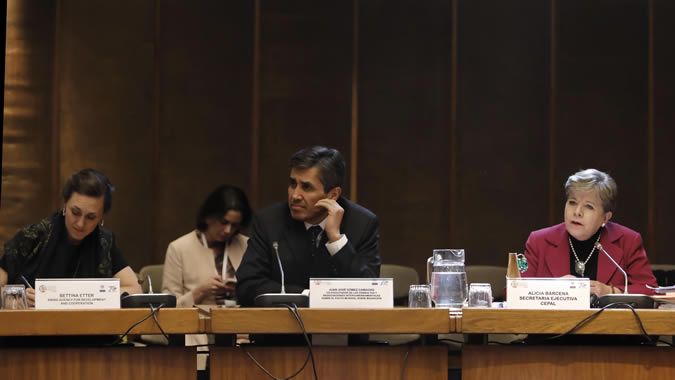Migration Requires Urgent Adoption of Agreements Aimed at Building Rights-based Governance
Work area(s)
In the framework of the second meeting of the Forum of the Countries of Latin America and the Caribbean on Sustainable Development, a briefing was held on regional progress regarding the global compact for safe, orderly and regular migration.

The situation of global and regional migration requires the urgent adoption of agreements aimed at building a governance based on rights, affirmed authorities and experts gathered today at the second meeting of the Forum of the Countries on Sustainable Development, which concluded this Friday, April 20, at the headquarters of the Economic Commission for Latin America and the Caribbean (ECLAC) in Santiago, Chile.
The briefing on regional progress regarding the global compact for safe, orderly and regular migration was led by Alicia Bárcena, ECLAC’s Executive Secretary; Ambassador Juan José Gómez Camacho, Permanent Representative of Mexico to the United Nations and Co-facilitator of the consultations and intergovernmental negotiations of the global compact on migration; and Bettina Etter, on behalf of Ambassador Jürg Lauber, the Representative of Switzerland to the United Nations, who is also Co-facilitator.
During her talk, Alicia Bárcena highlighted that for Latin America and the Caribbean the issue of migration requires the urgent adoption of agreements. She specified that, according to the latest censuses, more than 30 million people in the region live outside their countries of birth, a figure that represents 4% of the total population of Latin America and the Caribbean.
“We know that on a global level migration is a big problem, but on a regional level as well it requires the urgent adoption of agreements aimed at building a governance based on rights, which is born from a political conversation centered on evidence and technical analyses and that moves away from the beliefs and prejudices that have been so harmful,” the senior United Nations official said.
The Executive Secretary added that the majority of migrants from the region reside in the United States. She noted that there are 11.3% of migrants in an irregular or unauthorized situation.
“The trio of migration calls to us, the idea of the protection of migrant workers, the eradication of human trafficking and the reduction in the costs of transferring remittances are very clear objectives in the 2030 Agenda, this is an issue of common good that collaborates on the reduction of inequality and asymmetries,” she added.
Ambassador Juan José Gómez Camacho indicated, meanwhile, that “the global compact must become a kind of backbone of migration, because its main objective is to provide governance and it is totally linked to economic and social development and to our capacity to advance on reducing inequalities.”
Ambassador Gómez Camacho added that the global compact is not only in line with the 2030 Agenda, but that migration is also a great contributor to sustainable development.
“Migration, being a small part of the global population, contributes to 9% of the Gross Domestic Product, which is to say, nearly $7 trillion dollars per year produced directly by global migration,” he stated.
Related event
Type
Country(ies)
- Latin America and the Caribbean
